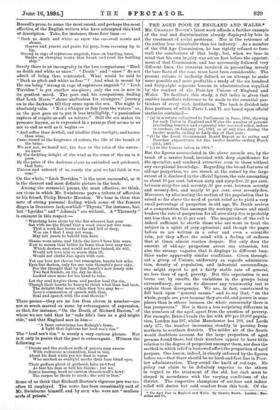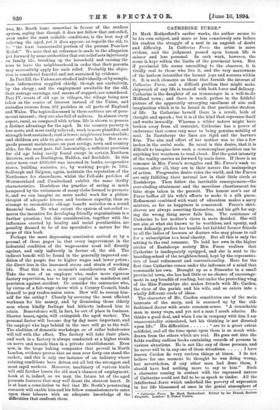THE AGED POOR IN ENGLAND AND WALES.* MR. CHARLES BOOTH'S
latest work affords a farther example of the zeal and discrimination already displayed by him in
the treatment of social problems. Nor is the reticence of the author less remarkable than his industry. As a member of the Old Age Commission, he has rightly refused to fore- stall the conclusions of that body; but, when we bear in mind that his own inquiry was set on foot before the appoint- ment of that Commission, and has necessarily followed very different lines, the restraint involved in presenting merely the bare facts of the case, must have been considerable. The present volume is modestly defined as an attempt to make more possible and more profitable a study of the six hundred and forty-eight separate lessons in administration supplied by the conduct of the Poor-law Unions of England and Wales. To facilitate this study, a full index is given that enables immediate reference to be made to the essential par- ticulars of every such institution. The book is divided into four portions, of which Parts I. and II. are based upon official statistics contained- " (a) in a return submitted to Parliament in June, 1893, showing for each Union in England and Wales the number of persons (excluding lunatics and vagrants) who received relief, indoor or outdoor, on January 1st, 1892, or at any time during the twelve months ending at Lady-day of that year : "(b) in the Local Government Board Report as to rating and Poor-law expenditure for the twelve months ending March 25th, 1891: "(c) in the Census taken in 1891."
But the figures accumulated in the above records are, by the touch of a master hand, invested with deep significance for the specialist, and rendered attractive even to those without any exceptional knowledge. Regarding the broad features of old-age pauperism, we are struck at the outset by the large extent of it disclosed in the official figures, the rate amounting to about 10 per cent. between sixty and sixty-five, 20 per cent. between sixty-five and seventy, 30 per cent. between seventy and seventy-five, and nearly 40 per cent, over seventy-five. Moreover, by eliminating the section of the population that is raised so far above the need of pariah relief as to yield a very small percentage of pauperism in old age, Mr. Booth arrives at a computation that amongst the working classes and email traders the rate of pauperism for all over sixty-five is probably not less than 40 to 45 per cent. The magnitude of the evil is indeed sufficient to startle those who are wont to treat the subject in a spirit of easy optimism; and though the pages before us are written in a sober and even a scientific vein, yet they affect the mind with a feeling of sadness that at times almost reaches despair. Not only does the amount of old-age pauperism arrest our attention, but also the strange vagaries that it displays in different loca- lities under apparently similar conditions. Given through- out a group of Unions, uniformity as regards administra- tion, density of population, and industrial surroundings, one might expect to get a fairly stable rate of general, no less than of aged, poverty. But this expectation is not borne out by results, the variations in the groups being extraordinary, nor can we discover any trustworthy teat to explain these divergencies. We are, in fact, constrained to fall back upon "general causes" and to say that, "on the whole, people are poor because they are old, and poorer in some places than in others because the whole community there is less prosperous." Nor is there a, less surprising difference in the numbers of the aged, apart from the question of poverty. For example, Bristol heads the list with 480 per 10,000 popula- tion, London has 397, whilst Manchester has 288, and Leeds only 277, the number increasing steadily in passing from northern to southern districts. The milder air of the South would doubtless account for the large proportion of aged persons found there, but their numbers appear to have little
relation to the degree of pauperism amongst them, nor does the method in which relief is bestowed affect the proportion of aged
paupers. One lesson, indeed, is clearly enforced by the figures before us,—that there should be no hard-and-fast line in Poor- law administration. They sound the knell of red-tape. No policy can claim to be definitely superior to the others in regard to the treatment of the old, but each must be shaped in accordance with the varying conditions of the district. The respective champions of outdoor and indoor relief will derive but cold comfort from this book. Of the
• The Aged Poor in England and Wales. By Charles Booth, London.: Mac- millan and Co. two, Mr. Booth leans somewhat in favour of the outdoor system, saying that though it does not follow that out-relief, even under the most suitable conditions, is the best way of relieving the aged, yet it does appear, as regards the old, to be "the least unsuccessful portion of the present Poor-law Relief." We note that no reference is made to the allegation put forward by some authorities that out-re]ief acts injuriously on family life, breaking up the household and causing the sons to leave the neighbourhood in order that their parents may successfully apply for such relief. Probably the objec- tion is considered fanciful and not sustained by evidence.
In Part IIL the Unions are studied individually, or by sample, from information supplied chiefly, though not exclusively, by the clergy ; and the employment awaitable for the old, their average earnings, and means of support, are considered. Part IV. treats of old age in villages, the village being now taken as the centre of interest instead of the Union, and embodies returns from 262 parishes in all parts of England and Wales. The topics discussed in these sections are of para- mount interest; they are also full of sadness. In almost every aspect, rural, as compared with urban, life is shown to possess a distinct advantage for the aged. In the country poverty is less acute and most easily relieved ; work is more plentiful, and strength best sustained; rent is lower; neighbours less churlish; and children are able to give more effective help. But as re- gards present maintenance on past savings, town and country alike, for the most part, fail lamentably, a sufficient provision for old age being rarely found except in certain Northern districts, such as Darlington, Halifax, and Rochdale. In this latter town over £900,000 was invested in banks, co-operative stores, building societies, &c., by working people in 1892. Sedburgh and Skipton, again, maintain the reputation of the Northerner for shrewdness, whilst the Fell-side parkhes of Westmoreland and Cumberland exhibit the same thrifty characteristics. Doubtless the practice of saving is much hampered by the rottenness of many clubs formed to promote it, and we can imagine no more useful work for a philan- thropist of adequate leisure and business capacity, than an attempt to reconstitute old-age benefit societies on a sound financial basis. To what extent the system of oat-relief re- moves the incentive for developing friendly organisations is a further question ; but this consideration, together with the influences exerted by locality and racial peculiarities, are possibly deemed to be of too speculative a nature for the scope of this book.
Perhaps the most depressing conclusion arrived at by a perusal of these pages is, that every improvement in the industrial condition of the wage-earner must tell directly against, and only indirectly in favour of, the old. The indirect benefit will be found in the generally improved con- dition of the people due to higher wages and lower prices ; the direct loss in the increased stress and strain of working life. That this is so, a moment's consideration will show. Take the case of an employer who, under more rigorous factory supervision, has to lay out capital in sanitation and provision against accident. Or consider the contractor who, by virtue of a fair-wage clause with a County Council, binds himself to pay trades-union rates. How will he recoup him- self for the outlay ? Clearly by securing the most efficient workmen for his money, and by dismissing those elderly men whom kindly feelings had hitherto induced him to retain. Benevolence will, in fact, be out of place in business. Shorter hours, again, will extinguish the aged worker. The personal factor will become day by day more important, and the employe who lags behind in the race will go to the wall. The abolition of domestic workshops or of cellar bakehouses will tell with like effect. The factory will take their place, and work in a factory is always conducted at a higher strain on nerve and muscle than in a private establishment. Even now, in the large baking companies that prevail in North London, evidence proves that no man over forty can stand the racket; and this is only one instance of an industry where existing conditions have driven out all but the strongest and most rapid workers. Moreover, machinery of various kinds will still further lessen the old man's chances of employment. Look at it, indeed, as we may, the future lot of the aged presents features that may well daunt the stoutest heart. It is at least a consolation to feel that Mr. Booth's penetrating research will enable him and his fellow commissioners to enter upon their labours with an adequate knowledge of the difficulties that confront them.



































 Previous page
Previous page